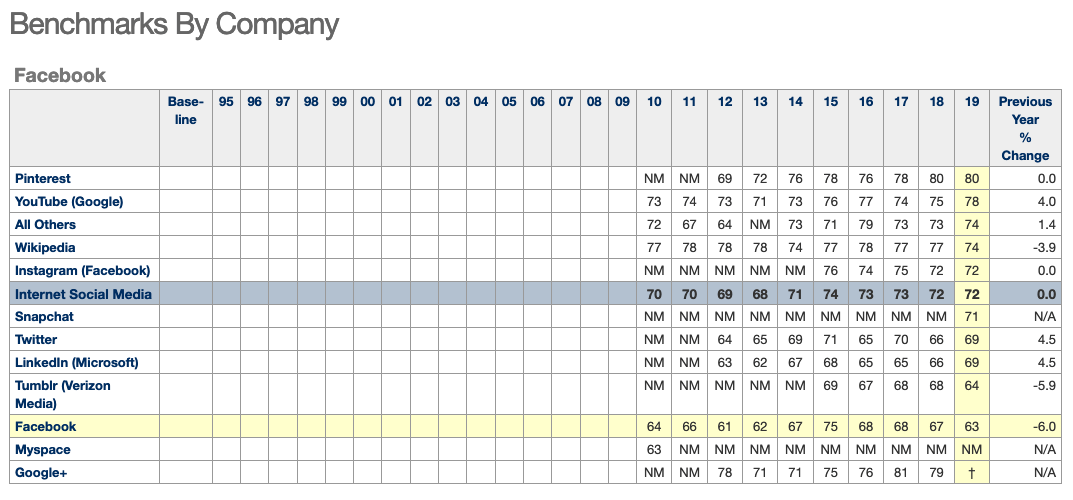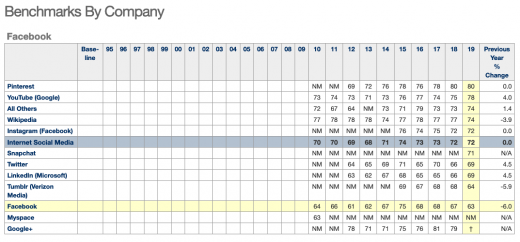Americans record lowest ‘satisfaction’ with Facebook since 2015, according to ASCI
Yet revenue and usage are still growing.
A steady stream of surveys and anecdotal evidence indicates Americans are less trusting and engaged with Facebook since the Cambridge Analytica data-privacy scandal broke in 2018. But the company’s most recent quarterly earnings data tell a completely different story — ad revenues are up and so are active users.
A seeming paradox
How do we reconcile these seemingly opposing trends? Does the network effect make people feel compelled to use Facebook? Have they become desensitized to data privacy issues? Do people believe that Facebook is genuinely addressing its privacy problems? Or is this simply the gap between what people say and what they do?
The latest evidence that Facebook is experiencing declining user satisfaction comes from the American Customer Satisfaction Index’s (ACSI’a) annual ranking of social media sites. (The ACSI is owned and administered by the University of Michigan.)

According to the survey, “ACSI results show a dramatic loss in user satisfaction with Facebook, and the site plummets 6% to the industry’s bottom with an ACSI score of 63.” This is 12 points off the company’s all-time high score of 75 in 2015.
Facebook behind other social sites
“Users also find advertising on Facebook to be more intrusive than other sites. But the bad news doesn’t stop there. In two new ACSI measures for social media websites, Facebook falls dead last. Users feel that the ease of uploading photos and videos is subpar compared with other sites in the category. Moreover, users are frustrated with Facebook’s news feed as the site’s content rates worst in class for relevancy. “
Pinterest is the top-ranking social media site in the ACSI survey, followed by YouTube. “Pinterest receives the top mark for mobile app quality, measured by the ACSI for the first time this year. For Pinners, even ads appear to meet their needs—Pinterest is top-ranked for providing a level of advertising that is most acceptable to users.”
30% revenue growth in North America
Contrast the ACSI critique with Facebook’s
In its earnings release, Facebook said that “more than 2.1 billion people now use Facebook, Instagram, WhatsApp, or Messenger … every day on average, and more than 2.7 billion people use at least one of our Family of services each month.”
At least some of the revenue and usage growth is being driven by Instagram. During the Q2 earnings call, Facebook CFO Dave Wehner said, “We’re seeing good impression growth across Instagram Stories, Instagram Feed and Facebook Feed.” Yet, as indicated, the Facebook Feed is also driving revenue growth. That reflects daily engagement. And advertisers (unlike some consumers) have shown no signs of wavering in their commitment to the platform.
A few possible explanations
So how do we explain this opinion-revenue gap? There are indications that Americans are now more skeptical about the possibility of online privacy than in the past. This may be a factor in people not quitting or reducing their time on Facebook (or other “intrusive” platforms) despite the survey data; “surveillance” is now just a part of being online. Indeed, there are some indications that people are using Facebook more cautiously now.
It’s probably also the case that people who express frustration, disappointment or anger in surveys don’t follow through with meaningful behavior change. And then there’s the network effect and the fear of missing out.
Marketing Land – Internet Marketing News, Strategies & Tips
(17)



